Air chief marshal is a high-ranking air officer rank used by some air forces, with origins from the Royal Air Force. The rank is used by air forces of many countries that have historical British influence. This rank is also equivalent to an Admiral in a navy or a full general in an army or other nations' air forces.
Marshal of the air force or marshal of the air is a five-star rank and an English-language term for the most senior rank in some air forces. It is usually the direct equivalent of a general of the air force in other air forces, a field marshal or general of the army in many armies, or a naval admiral of the fleet.
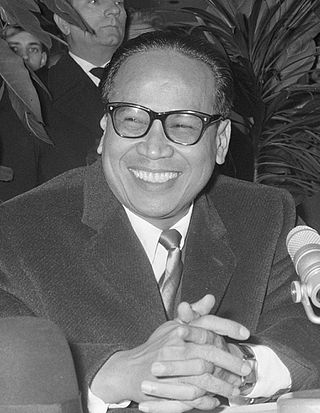
Subandrio was an Indonesian politician Foreign Minister and First Deputy Prime Minister of Indonesia under President Sukarno. Removed from office following the failed 1965 coup, he spent 29 years in prison.
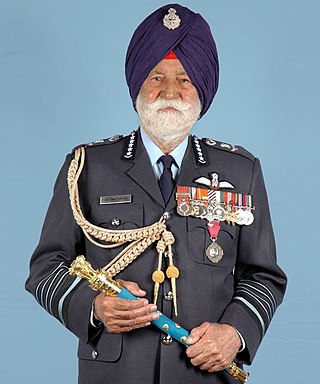
Marshal of the Indian Air Force Arjan Singh, was a senior air officer of the Indian Air Force. He served as the 3rd Chief of the Air Staff from 1964 to 1969, leading the Air Force through the Indo-Pakistani War of 1965. He was the first and only officer of the Indian Air Force (IAF) to be promoted to five-star rank as Marshal of the Indian Air Force, equal to the army rank of Field Marshal.
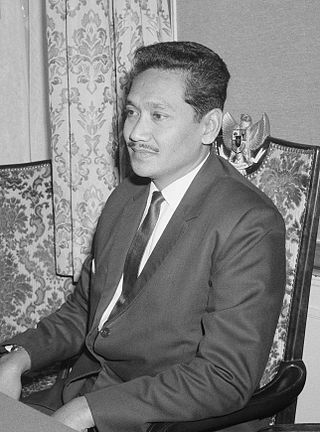
Air Chief Marshal (Ret.) Omar Dhani was commander of the Indonesian Air Force (TNI-AU) from 1962 until 1965. He was a leading leftist figure in Indonesia during the Sukarno era.

Marshal of the Royal Air Force Sir John Grandy, was a senior officer in the Royal Air Force. He was the only officer who fought and commanded a squadron during the Battle of Britain to reach the post of Chief of the Air Staff. In the latter role he implemented the final stages of the RAF's withdrawal from the Persian Gulf and the Far East, oversaw the ordering and subsequent cancellation of the F-111 strike aircraft and handed over Britain's nuclear deterrent role to the Royal Navy.

The Vice Chief of the Air Staff (VCAS) is the deputy to the Chief of the Air Staff of India and second-highest ranking officer of the Indian Air Force. The VCAS is a PSO at Air Headquarters at New Delhi. In the event that the Chief of Air Staff (CAS) is absent or is unable to perform his duties, the VCAS assumes the duties and responsibilities of the CAS. The VCAS is normally held by an officer of three star rank and is held by an air officer of the rank of Air Marshal.
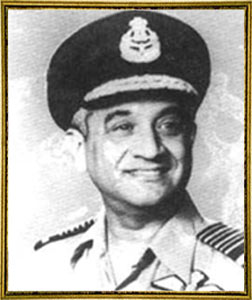
Idris Hasan Latif, PVSM was a former air officer in the Indian Air Force. He served as the 10th Chief of Air Staff (CAS) of the Indian Air Force (IAF) from 1978 to 1981. After retiring from the air force, he served as 11th Governor of Maharashtra from 1982 to 1985.

Air Chief Marshal Djoko Suyanto was the Commander of the Indonesian National Armed Forces from 2006 to 2007. After ending his services as the commander, he served as the Coordinating Minister for Legal, Political, and Security Affairs in President Susilo Bambang Yudhoyono's Second United Indonesia Cabinet.

The Most Noble Order of the Crown of Thailand is a Thai order, established in 1869 by King Rama V of The Kingdom of Siam for Thais, the royal family, governmental employees, and foreign dignitaries for their outstanding services to the Kingdom of Thailand. The order originally had seven classes. The special class was added by King Rama VI in 1918. Formerly called The Most Noble Order of the Crown of Siam.

A five-star rank is the highest military rank in many countries. The rank is that of the most senior operational military commanders, and within NATO's standard rank scale it is designated by the code OF-10. Not all armed forces have such a rank, and in those that do the actual insignia of the five-star ranks may not contain five stars. For example: the insignia for the French OF-10 rank maréchal de France contains seven stars; the insignia for the Portuguese marechal contains four gold stars. The stars used on the various Commonwealth of Nations rank insignias are sometimes colloquially referred to as pips, but in fact either are stars of the orders of the Garter, Thistle or Bath or are Eversleigh stars, depending on the wearer's original regiment or corps, and are used in combination with other heraldic items, such as batons, crowns, swords or maple leaves.

The Pingat Jasa Gemilang (Tentera) is a decoration awarded to members of the Singapore Armed Forces for exceptionally distinguished performance or extraordinary service, or the furtherance of links with overseas forces.
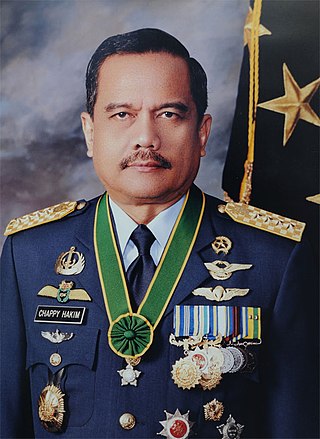
Air Chief Marshal (Retired) Chappy Hakim, is the 14th Chief of Staff of the Indonesian Air Force who assumed his appointment from 2002 to 2005.

Air Marshal Sir Valston Eldridge Hancock, was a senior commander in the Royal Australian Air Force (RAAF). He served as Chief of the Air Staff from 1961 to 1965. A graduate of the Royal Military College, Duntroon, Hancock transferred from the Army to the RAAF in 1929 and qualified as a pilot. His administrative training at Duntroon saw him mainly occupy staff posts, including Deputy Director of Operations and Intelligence at RAAF Headquarters from 1931 to 1935, and Director of Works and Buildings from 1937 to 1939. During the early years of World War II, he commanded No. 1 Bombing and Gunnery School, and held senior planning and administrative positions. He eventually saw combat in the Aitape–Wewak campaign of the Pacific War during 1945. Flying Bristol Beaufort light bombers, he led first No. 100 Squadron, and later No. 71 Wing. His actions earned him the Distinguished Flying Cross.

The Second Working Cabinet was an Indonesian cabinet that served from 18 February 1960 until 6 March 1962, when President Sukarno reshuffled it.
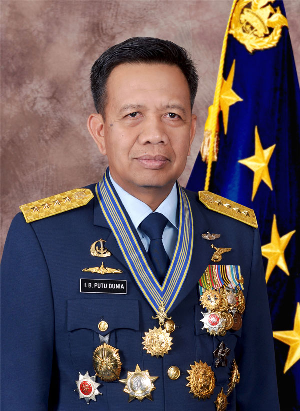
Air Chief Marshal (Ret) Ida Bagus Putu Dunia is the former Chief of Staff of the Indonesian Air Force. He briefly served as the head of the Indonesian Military Command and

Air Chief Marshal (Ret.) Hadi Tjahjanto is the Coordinating Minister for Political, Legal, and Security Affairs under President Joko Widodo's Onward Indonesia Cabinet, replacing Mahfud MD due to his resignation. He is a former officer in the Indonesian Air Force who previously served as the 20th Commander of the Indonesian National Armed Forces. An alumnus of the Indonesian Air Force Academy and Flight School, he was appointed by president Joko Widodo in 2017 as the Commander of the Armed Forces (Panglima).

Air Chief Marshal (Ret.) Yuyu Sutisna is a retired air chief marshal who was the 27th Chief of Staff of the Indonesian Air Force. Previously, he had served as deputy chief of staff, in addition to commander of the 1st Air Force Operational Command and the national air defense forces command.

The Chief of Staff of the Indonesian Air Force is the highest position in the Indonesian Air Force. The position is held by the four-star Marshal, appointed by and reporting directly to the Commander of the Indonesian National Armed Forces. Chief of Staff is assisted by Vice Chief of Staff of the Indonesian Air Force, position is held by three-star Marshal.

Air Chief Marshal Fadjar Prasetyo is an Indonesian air chief marshal who was Chief of Staff of the Indonesian Air Force from May 2020 to April 2024.


















